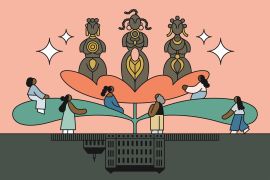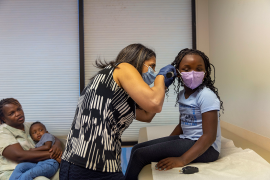In July, New Jersey Governor Jon Corzine signed into law comprehensive health reform that helps the state move toward universal access to health coverage. A key feature is a "Kids First" mandate: beginning July 2009, all state residents up to age 19 will be required to have health coverage.
"This is a 'soft' mandate, with carrots, not sticks," says Suzanne Esterman, spokeswoman for New Jersey's Department of Human Services. There are currently no penalties for non-compliance, but there are many opportunities to obtain affordable coverage. NJ FamilyCare, the state's SCHIP program, is available to children in families with income up to 350 percent of the FPL, or $74,200 per year for a family of four.[1] Families with incomes above 350 percent of FPL can buy into reasonably priced insurance for their children through NJ FamilyCare ADVANTAGE. Families will be asked to indicate on their New Jersey tax returns whether their dependents have health insurance coverage. The state will send applications and conduct outreach to families identified as having uninsured children who may be eligible for Medicaid or NJ FamilyCare. Task forces are currently developing strategies to enhance outreach and enrollment activities.
Another key feature of the health reform is an expansion of NJ FamilyCare to parents with incomes from 133 to 200 percent of FPL, with premiums and copayments tied to a sliding scale as income rises above 150 percent of the FPL. The expansion began September 1, and officials expect that, by the end of state fiscal year 2009, an additional 17,500 parents and 10,000 children will enroll. (Experience nationwide indicates that coverage expansions to parents result in having more children enroll as well.) Additional state costs are estimated at $11.3 million for the year, coming from general revenues, with the federal government providing matching funds.
New Jersey's health reform also makes changes intended to make individual health insurance more affordable to young adults and to increase insurer participation in the small group market.
At this point, officials do not expect that the national economic crisis will lead them to scale back the health reforms. "New Jersey's cost of living is so high that we'll do what we can to help alleviate additional stress on our families' finances," says Esterman.
Reference
[1] The federal government is currently continuing to provide the match, having backed away from enforcing its August 2007 directive that it would not approve matching funds for families with incomes above 250 percent of the FPL, unless 95 percent of a state's eligible children in families with incomes under 200 percent of FPL are already enrolled (see Federal Activity for discussion).
"This is a 'soft' mandate, with carrots, not sticks," says Suzanne Esterman, spokeswoman for New Jersey's Department of Human Services. There are currently no penalties for non-compliance, but there are many opportunities to obtain affordable coverage. NJ FamilyCare, the state's SCHIP program, is available to children in families with income up to 350 percent of the FPL, or $74,200 per year for a family of four.[1] Families with incomes above 350 percent of FPL can buy into reasonably priced insurance for their children through NJ FamilyCare ADVANTAGE. Families will be asked to indicate on their New Jersey tax returns whether their dependents have health insurance coverage. The state will send applications and conduct outreach to families identified as having uninsured children who may be eligible for Medicaid or NJ FamilyCare. Task forces are currently developing strategies to enhance outreach and enrollment activities.
Another key feature of the health reform is an expansion of NJ FamilyCare to parents with incomes from 133 to 200 percent of FPL, with premiums and copayments tied to a sliding scale as income rises above 150 percent of the FPL. The expansion began September 1, and officials expect that, by the end of state fiscal year 2009, an additional 17,500 parents and 10,000 children will enroll. (Experience nationwide indicates that coverage expansions to parents result in having more children enroll as well.) Additional state costs are estimated at $11.3 million for the year, coming from general revenues, with the federal government providing matching funds.
New Jersey's health reform also makes changes intended to make individual health insurance more affordable to young adults and to increase insurer participation in the small group market.
At this point, officials do not expect that the national economic crisis will lead them to scale back the health reforms. "New Jersey's cost of living is so high that we'll do what we can to help alleviate additional stress on our families' finances," says Esterman.
|
[1] The federal government is currently continuing to provide the match, having backed away from enforcing its August 2007 directive that it would not approve matching funds for families with incomes above 250 percent of the FPL, unless 95 percent of a state's eligible children in families with incomes under 200 percent of FPL are already enrolled (see Federal Activity for discussion).


